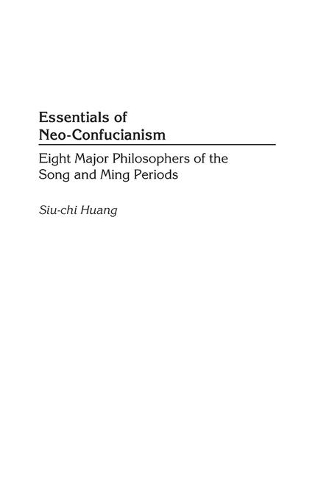
Essentials of Neo-Confucianism: Eight Major Philosophers of the Song and Ming Periods
(Hardback)
Publishing Details
Essentials of Neo-Confucianism: Eight Major Philosophers of the Song and Ming Periods
By (Author) Siu-Chi Huang
Bloomsbury Publishing PLC
Greenwood Press
30th November 1999
United States
Classifications
Tertiary Education
Non Fiction
Confucianism
181.112
Physical Properties
Hardback
280
Width 156mm, Height 235mm
624g
Description
This analytical presentation of major Neo-Confucian philosophers, from the 11th to the 16th centuries, examines Zhou Dunyi (1017-1073), Shao Yong (1011-1077), Zhang Zai (1020-1077), Cheng Hao (1032-1085), Cheng Yi (1033-1107), Zhu Xi (1130-1200), Lu Xiangshan (1139-1193) and Wang Yangming (1427-1529). With its focus on metaphysical, epistemological and ethical philosophical issues, Huang's study presents the historical development of the Neo-Confucian school, an outgrowth of ancient Confucianism, and characterizes its thought, background and influence. Key concepts, for example tai-ji (supreme ultimate), xin (mind) and ren (humanity), as interpreted by each thinker are discussed in detail. The two major schools that developed during these six centuries are examined as well: Lu-Wang, School of Mind, developed in criticism of Cheng-Zhu, School of Principle. The two schools, despite different approaches toward their philosophical pursuits, were convinced that their common goal, to bring about harmonious relationships between man and the universe and between man and man, could be achieved through different ways of philosophizing. To understand the Chinese mind, it is necessary to understand the Neo-Confucianism as a reformation of early Confucianism. Scholars of Eastern religions and philosophy should appreciate the objective interpretations of each thinker's philosophy, for which pertinent passages spoken by each man have been selected and translated by the author from the original Chinese, and the comparisons of the Neo-Confucian philosophies with those of the West. An introduction provides the historical background in which to study the rise of Neo-Confucianism. The study is organized chronologically and includes a glossary of terms and a bibliography which serves as a helpful guide for further research.
Reviews
The student and general reader will find this a ready-reference. * American Reference Books Annual *
This text makes an excellent source- and reference-book, both for the student of Chinese culture as well as for those interested in general themes of philosophy, metaphysics, and ethics. * Journal of Church and State *
Author Bio
Siu-chi Huang is professor emerita of philosophy and former department chair of Beaver College in Pennsylvania. She received her PhD from the University of Pennsylvania and an honorary doctorate of letters from Beaver College. In addition to being a former visiting professor at the University of Hawaii, Xiamen (Amoy) University, and Fudan University (Shanghai), Dr. Huang is also the author of Lu Hsiang-shan: A Twelfth Century Idealist Philosopher (1944) and Zhang Zai (1987). Works Dr. Huang has translated include George Berkeley's Three Dialogues Between Hylas and Philonous and Josiah Royce's Sources of Religious Insight.
